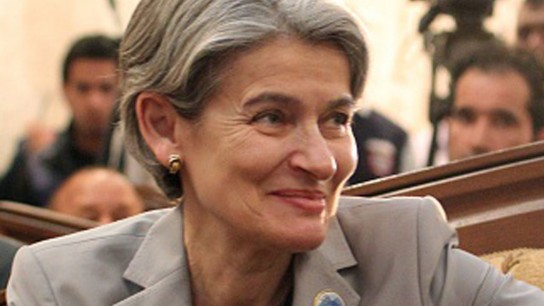Who will replace Ban Ki-moon as next United Nations chief?
Bulgarians Irina Bokova and Kristalina Georgieva lead the race to become secretary general

A free daily email with the biggest news stories of the day – and the best features from TheWeek.com
You are now subscribed
Your newsletter sign-up was successful
The starting gun is being fired today in the race to become the next secretary general of the United Nations.
For the first time, member states will get a chance to question the applicants in what the UN describes as "a job interview in front of the whole world".
There are currently eight candidates vying to replace Ban Ki-moon, whose five-year tenure will finish at the end of the year.
The Week
Escape your echo chamber. Get the facts behind the news, plus analysis from multiple perspectives.

Sign up for The Week's Free Newsletters
From our morning news briefing to a weekly Good News Newsletter, get the best of The Week delivered directly to your inbox.
From our morning news briefing to a weekly Good News Newsletter, get the best of The Week delivered directly to your inbox.
Who are the favourites?
Under an informal regional rotation system, the next UN chief is widely expected to be from Eastern Europe. There is also growing pressure for a woman to be appointed to the top job for the first time.
As such, two favourites have emerged, both hailing from Bulgaria.
Kristalina Georgieva is a former vice president of the World Bank and is currently vice president of the European Commission. However, some predict her appointment could be blocked by Russia.
A free daily email with the biggest news stories of the day – and the best features from TheWeek.com
"Moscow won't accept her because she has led the central mechanism that imposed EU sanctions on Russia," says Forbes.
Her main rival is Irina Bokova, who has been director general of Unesco since 2009.
She has made fighting for gender equality in education her personal mission and is a leading champion in the battle against racism and anti-Semitism.
Who else is standing?
Four men and two other women have officially thrown their hats in the ring, according to the Financial Times.
They are: former Moldovan foreign minister Natalia Gherman; former New Zealand prime minster Helen Clark, now head of the UN Development Programme; former Croatian foreign minister Vesna Pucic; Montenegro's foreign minister Igor Luksic; former Slovenian president Danilo Turk, and Portugal's former prime minister Antonio Guterres.
How will the selection process work?
Following a push for greater transparency within the organisation, the selection process will no longer be held behind closed doors.
Each candidate will be presented to the UN's general assembly and then quizzed by representatives of each member state and the press. The public is also invited to submit questions via social media.
"This is a potentially game-changing process, "says Mogens Lykketoft, the president of the general assembly.
The next round of presentations will begin in June, with the Security Council beginning deliberations in July.
-
 Democrats push for ICE accountability
Democrats push for ICE accountabilityFeature U.S. citizens shot and violently detained by immigration agents testify at Capitol Hill hearing
-
 The price of sporting glory
The price of sporting gloryFeature The Milan-Cortina Winter Olympics kicked off this week. Will Italy regret playing host?
-
 Fulton County: A dress rehearsal for election theft?
Fulton County: A dress rehearsal for election theft?Feature Director of National Intelligence Tulsi Gabbard is Trump's de facto ‘voter fraud’ czar
-
 Epstein files topple law CEO, roil UK government
Epstein files topple law CEO, roil UK governmentSpeed Read Peter Mandelson, Britain’s former ambassador to the US, is caught up in the scandal
-
 Iran and US prepare to meet after skirmishes
Iran and US prepare to meet after skirmishesSpeed Read The incident comes amid heightened tensions in the Middle East
-
 Israel retrieves final hostage’s body from Gaza
Israel retrieves final hostage’s body from GazaSpeed Read The 24-year-old police officer was killed during the initial Hamas attack
-
 China’s Xi targets top general in growing purge
China’s Xi targets top general in growing purgeSpeed Read Zhang Youxia is being investigated over ‘grave violations’ of the law
-
 Panama and Canada are negotiating over a crucial copper mine
Panama and Canada are negotiating over a crucial copper mineIn the Spotlight Panama is set to make a final decision on the mine this summer
-
 Why Greenland’s natural resources are nearly impossible to mine
Why Greenland’s natural resources are nearly impossible to mineThe Explainer The country’s natural landscape makes the task extremely difficult
-
 Iran cuts internet as protests escalate
Iran cuts internet as protests escalateSpeed Reada Government buildings across the country have been set on fire
-
 US nabs ‘shadow’ tanker claimed by Russia
US nabs ‘shadow’ tanker claimed by RussiaSpeed Read The ship was one of two vessels seized by the US military